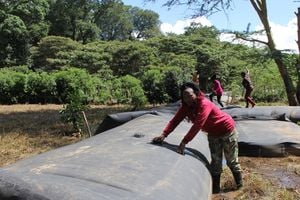‘Beast of Forest Road’ epithet is bad for the presumption of innocence

Boda boda operator, Zachariah Nyaora Obadia (right), when he appeared at the Milimani Law Courts on March 15, 2022 for allegedly masterminding the sexual assault of a female motorist in Nairobi.
What you need to know:
- Mr Obadia’s reputation has been drastically affected by the “beast” headlines.
- The negative effects may be with him for the rest of his life.
"The Beast of Forest Road” was the Daily Nation front-page splash on Thursday last week. The headline was a parody of the title of a children’s book by Kyle Maurey about a monster which lives in the forest. But it was the newspaper’s characterization of Zachariah Nyaoga Obadia, the man police say masterminded the sexual assault on a woman motorist on Professor Wangari Maathai Road (formerly Forest Road) on March 4.
The Nation repeated the “beast” characterisation of Mr Obadia on Tuesday this week with a headline on page 9 that said: “Beast of Forest Road: Key suspect arrested.”
The implication of the two headlines is that Mr Obadia was guilty — even though he had not been arrested, arraigned and convicted. This is what we call trial by the media — prejudging a criminal case.
Adverse pretrial media publicity can humiliate, embarrass, shame or stigmatise an accused person. It can portray the person as guilty even when innocent. Mr Obadia’s reputation has been drastically affected by the “beast” headlines. The negative effects may be with him for the rest of his life.
However, let me hasten to add that the Nation dropped the epithet “beast” in its headline on Wednesday, after Mr Obadia was taken to court. The headline then read: “Suspected boda boda gang leader to be held for 10 days”. The accompanying story also used the word “allegedly” in connection with the police claim that he was the gang leader.
Now, that’s proper reporting of criminal court proceedings. It’s objective. Neutral. Calling Mr Obadia a “beast” gave the impression that his behaviour was savage, crude and violent. Other epithets evoked by the headlines were monster, brute, evildoer, fiend, villain, psychopath, gangster and the like.
Although the “beast” headlines can be said to reflect the popular feelings of members of the public, they can impact negatively on Mr Obadia’s right to the presumption of innocence and right to a fair trial as provided in the Constitution. Indeed, such headlines have the potential to compromise the impartiality of a trial magistrate and result in an unfair trial. The courts in Kenya, however, deny that pretrial media publicity can influence magistrates and judges.
Th question of whether adverse media publicity violates an accused person’s right to a fair trial was exhaustively dealt with by the 2019 Court of Appeal case Philomena Mbete Mwilu v Director of Public Prosecutions & 3 Others. Deputy Chief Justice Mwilu complained that adverse pretrial publicity, including a Daily Nation front-page headline that proclaimed “How Mwilu finally fell”, violated her right to a fair trial.
The court said: “In a criminal justice system such as ours in which the trial is conducted by a judicial officer as opposed to trial by jury, pre-trial media publicity or any media publicity cannot influence the mind of the trial court which is manned by a competent and independent judicial officer.”
However, individual judges agree that the impact of pre-trial publicity cannot be entirely discounted. In the 1946 US Supreme Court case Pennekamp v Florida, Justice Stanley Reed said judges are also human “and we know better than did our forbears how powerful is the pull of the unconscious and how treacherous the rational process.... And since judges, however stalwart, are human, the delicate task of administering justice ought not to be made unduly difficult by irresponsible print (media).”
In his book The Nature of the Judicial Process, Benjamin Cardozo, one of the greatest judges of the US Supreme Court, refers to the many forces that may influence a judge. “The great tides and currents which engulf the rest of men, do not turn aside in their course, and pass the judges by,” he says.
Here at home, in the 2013 case of Republic v Attorney General & 3 Others, Justice Joseph Mutava says: “My view is that adverse media publicity may negatively impact upon the rights of an accused person, particularly where the reporting extends to opinions that amount to pre-judging the (person’s) guilt.”
So we can safely say trial by the media — prejudging criminal cases — can compromise justice. The media should, therefore, be content to report the facts and leave the courts alone to judge.
The Public Editor is an independent news ombudsman who handles readers’ complaints on editorial matters including accuracy and journalistic standards. Email: [email protected]. Call or text 0721989264





